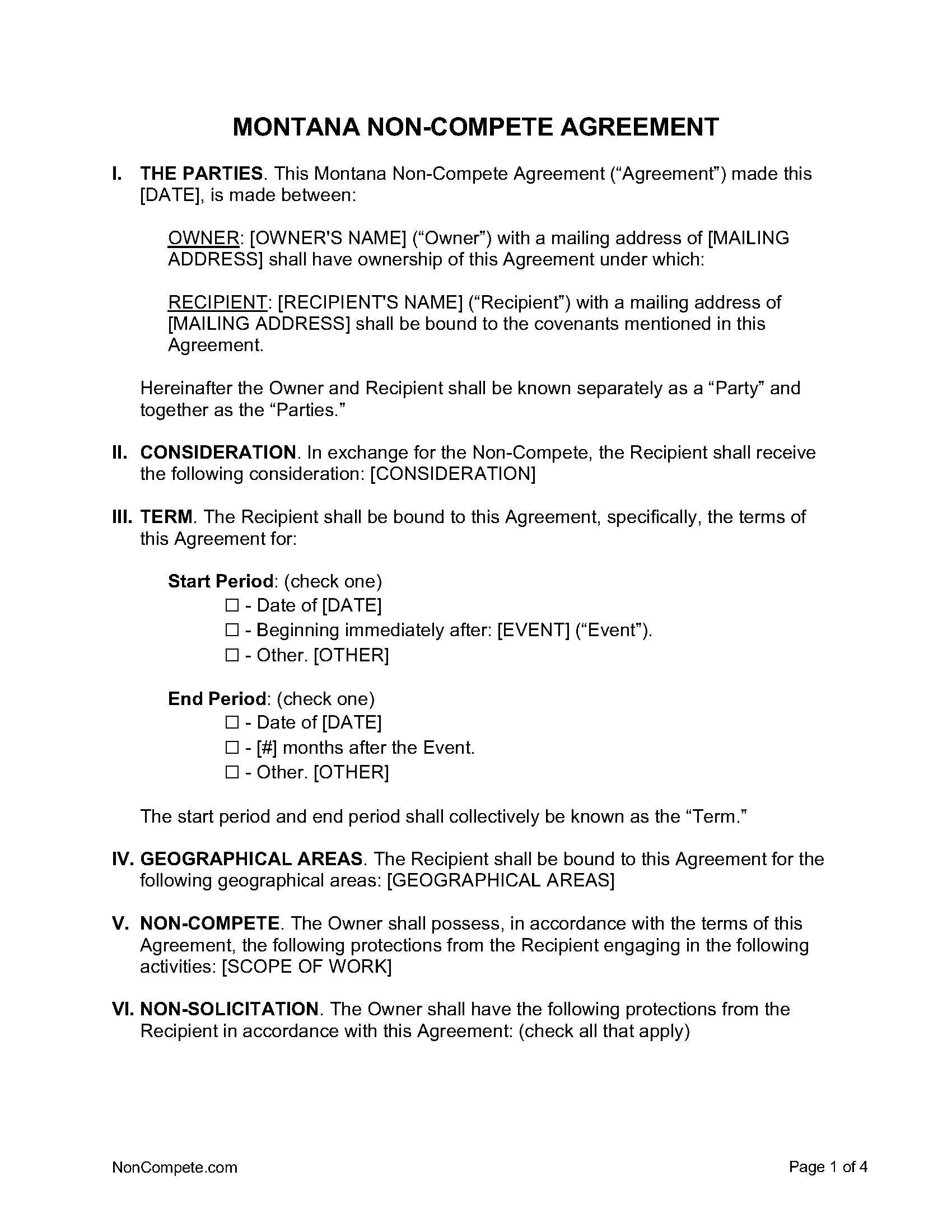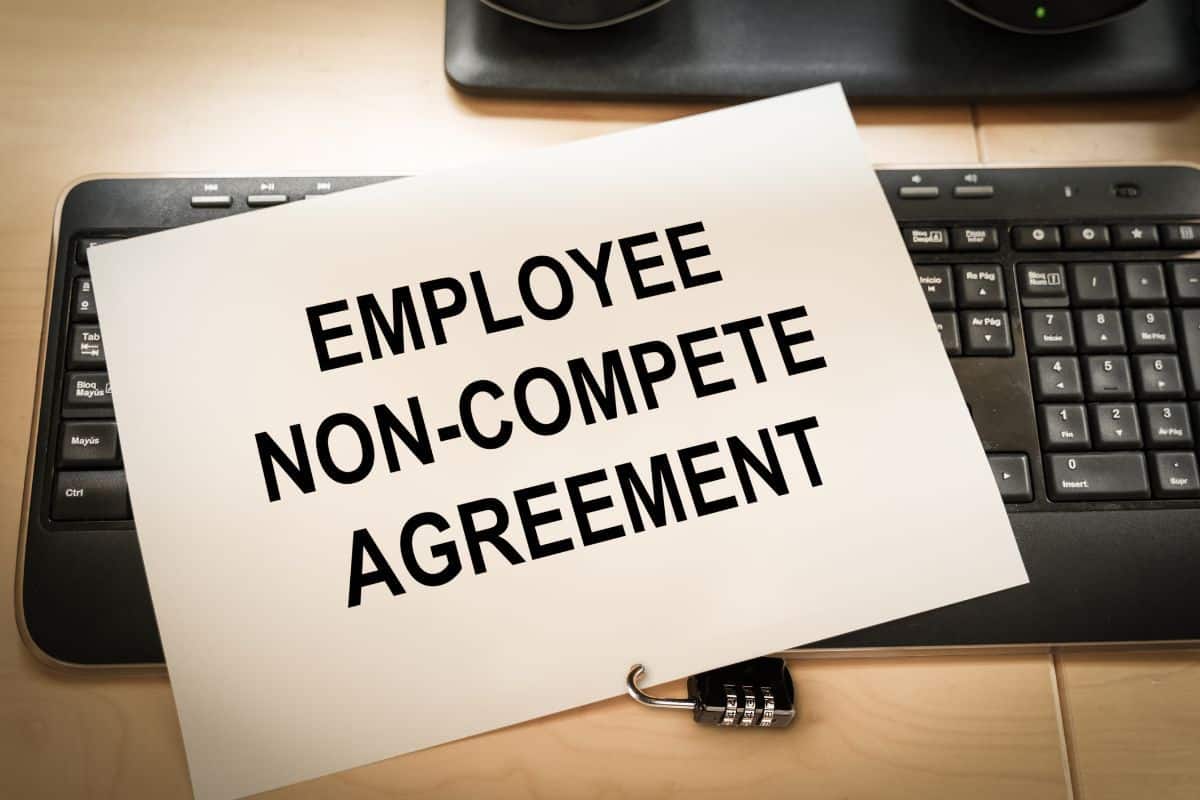Are Non Competes Enforceable In Kansas?
Are non competes enforceable in Kansas, or are they merely a legal gray area that leaves both employers and employees uncertain about their rights and obligations? In the Sunflower State, the question of whether non-competes are enforceable in Kansas has been a topic of significant discussion and debate among legal experts and business professionals.
Author:Mia ThompsonReviewer:Calvin PenwellNov 15, 202334.9K Shares484.9K Views

In the competitive landscape of the modern job market, non-compete agreements have become a standard tool used by employers to protect their business interests. These agreements, often signed by employees, restrict their ability to work for competitors or start their businesses in the same industry for a certain period after leaving their current job.
However, the enforceability of such agreements varies from state to state, and this article will delve into the specifics of “Are non competes enforceable in Kansas?”.
Understanding Non-Compete Agreements
In a non-compete agreement, one party (often an employee) agrees not to compete with the other party (typically an employer) once the employee's employment with the employer ends.
Non-compete agreements are legal contracts used by employers to protect their business interests, and they play a crucial role in the employment landscape. These agreements, often signed by employees as a condition of their employment, have gained both popularity and scrutiny in recent years.
The Purpose Of Non-Compete Agreements
Non-compete agreements serve a specific purpose: to prevent employees from engaging in activities that could harm their current employer's interests. These activities often involve working for competitors, starting their competing businesses, or soliciting clients and fellow employees. The underlying principle is to protect the company's trade secrets, confidential information, and established customer base.
The scope and enforceability of non-compete agreements can vary widely depending on factors such as state law, industry standards, and the specific language used in the agreement. To better understand these variations, it's crucial to delve into the critical components of non-compete agreements.
Non-Compete Laws In Kansas
Non-compete agreements in Kansas are only enforceable if their "terms are reasonable and necessary to protect a legitimate business interest of the employer such as customer relations or trade secrets."
An employee is free to compete with a former employer. Still, the latter can utilize a non-compete clause in the employee's contract to prohibit the former from taking clients or exploiting trade secrets.
Key Factors Influencing Enforceability
Non-compete agreements in Kansas, like in many other states, are subject to scrutiny by the courts. Several factors can influence whether such agreements are deemed enforceable.
Time And Geographic Scope
The duration and geographical scope of the restrictions within a non-compete agreement play a significant role in its enforceability. Agreements with overly broad limitations on when and where an employee can work may be considered unenforceable, as they can severely impact an individual's ability to earn a livelihood.
Consideration
To be legally valid and enforceable, a non-compete agreement must be supported by adequate consideration. This consideration can come in various forms, such as initial employment, promotions, raises, or other benefits provided by the employer. With consideration, the agreement may hold up in court.
Required In Writing
For a non-compete agreement to be enforceable in Kansas, it must be in writing. Oral agreements are generally not recognized under the law. This requirement underscores the importance of having a clear and documented agreement in place.
Are Non Competes Enforceable In Kansas - Requirements And Challenges
Creating and enforcing non-compete agreements in Kansas requires a careful balance of legal and business considerations. Employers want to protect their proprietary information and client relationships, while employees want to ensure they have the freedom to pursue their careers.
To create and maintain enforceable non-compete agreements in Kansas, it's essential to understand the specific requirements and challenges involved.
Requirements For Enforceable Non-Compete Agreements In Kansas
Enforceable non-compete agreements in Kansas must meet specific legal criteria to be upheld in court. Key requirements include.
Legitimate Business Interest
A valid non-compete agreement must serve a legitimate business interest. This can include protecting trade secrets, confidential information, customer relationships, or specialized training received by the employee. The agreement should clearly specify the nature of the business interest it aims to protect.
Reasonable Time And Geographic Scope
Non-compete agreements in Kansas must have reasonable time and geographic restrictions. Overly broad limitations on when and where an employee can work are less likely to be enforceable, as they may unduly hinder the employee's ability to pursue their chosen profession.
Adequate Consideration
For an agreement to be legally valid, it must be supported by adequate consideration. Consideration can come in various forms, such as initial employment, promotions, salary increases, or access to proprietary information. The employee must receive something of value in exchange for agreeing to the restrictions.
Public Policy Considerations
Non-compete agreements that contravene public policy will not be upheld in Kansas. If an agreement unreasonably restricts an individual's ability to earn a livelihood or unduly stifles competition, it may be considered against public policy, and the court may not enforce it.
Written Agreement
Non-compete agreements in Kansas must be in writing to be enforceable. Oral agreements are generally not recognized under the law. Having a clearly documented agreement is essential to meet this requirement.
Challenges In Enforcing Non-Compete Agreements
While creating a non-compete agreement that meets the legal requirements is essential, it's equally important to consider the challenges involved in enforcing such agreements in Kansas. These challenges may include:
Legal Scrutiny
Non-compete agreements are subject to legal scrutiny, and courts in Kansas will carefully review the terms and conditions. Any ambiguities or overly restrictive provisions may lead to the agreement being invalidated.
Employee Mobility
In today's job market, employee mobility is higher than ever. Employees change jobs frequently, and their careers often involve moving between companies and industries. Enforcing a non-compete agreement can become challenging when an employee seeks employment outside of the restricted geographic area.
Legal Costs
Enforcing a non-compete agreement can involve legal costs, such as attorney fees and court expenses. Employers must weigh the potential benefits of enforcement against these costs.
Drafting A Non-Compete Agreement In Kansas
Non-compete agreements are valuable tools for employers seeking to protect their business interests, and crafting an effective one is essential for both employers and employees in Kansas. When drafting a non-compete agreement, it's crucial to consider the specific legal and business factors that apply in the state.
In Kansas, non-compete agreements are generally upheld, and the courts seldom get involved in non-compete disputes.
Legal Framework In Kansas
To draft an effective non-compete agreement in Kansas, it's vital to understand the state's legal framework. Non-compete agreements in the state are governed by the Kansas Uniform Trade Secrets Act (KUTSA), which primarily focuses on safeguarding trade secrets and confidential information. While KUTSA doesn't explicitly mention non-compete agreements, these agreements are often closely related to the protection of trade secrets.
Key Elements To Include In Non-Compete Agreements
A well-drafted non-compete agreement should contain specific elementsto ensure its enforceability in Kansas.
Definition Of Protected Interests
The agreement should specify the legitimate business interests it aims to protect. These interests may include trade secrets, customer lists, confidential information, or specialized training provided to the employee.
Clear And Reasonable Restrictions
The agreement should outline clear and reasonable restrictions on the employee's activities, including the duration and geographical scope of the non-compete. Overly broad or vague restrictions are more likely to be challenged in court.
Consideration For The Employee
To make the agreement legally valid, the employee must receive adequate consideration in return for agreeing to the restrictions. Consideration can take various forms, such as employment, promotions, salary increases, or access to proprietary information.
Public Policy Compliance
The agreement must align with public policy. Provisions that unreasonably hinder an individual's ability to earn a living or unduly restrict competition may be considered against public policy and may not be enforceable.
Confidentiality And Non-Solicitation Clauses
In addition to non-compete provisions, consider including confidentiality and non-solicitation clauses. Confidentiality clauses protect sensitive business information, while non-solicitation clauses prevent employees from soliciting the employer's customers and employees.
Remedies For Breach
Specify the remedies available in case of a breach, such as injunctive relief, monetary damages, or attorney's fees. Clearly outlining the consequences of non-compliance can serve as a strong deterrent.
Consequences Of Violating A Non-Compete Agreement
Violating a non-compete agreement can have significant consequences for the parties involved, including employees and employers. Understanding the potential repercussions is crucial for anyone operating in the employment landscape of Kansas.
Your employee may request an injunction from the courts to prohibit improper competition and may take legal action to collect damages if you breach the provisions of a legally valid non-compete agreement. Your non-compete agreement spells out the repercussions.
Legal Actions By The Employer
When an employee breaches a non-compete agreement, the employer has the option to take legal action to enforce the terms of the agreement. Legal remedies available to the employer may include.
Injunctive Relief - Employers can seek injunctive relief from the court, which is a court order that restrains the employee from engaging in the prohibited activities. This effectively prevents the employee from working for a competitor or soliciting the employer's clients.
Monetary Damages - Employers may also seek monetary damages, which can include compensation for financial losses resulting from the breach. This may cover lost profits, costs of recruiting and training new employees, and any other damages incurred.
Attorney's Fees - Some non-compete agreements specify that the breaching party is responsible for covering the legal costs incurred by the prevailing party. If the employer prevails in court, the employee could be required to pay the employer's attorney's fees.
Employee Liability
Employees who breach a non-compete agreement in Kansas can face significant liability, including potential financial consequences. The employee may be required to pay monetary damages to the employer for the harm caused by the breach.
The employee might also face legal costs related to defending against the employer's claims. These legal expenses can be substantial, and employees may need to hire an attorney to represent them.
Damaged Reputation
Breaching a non-compete agreement can damage an employee's professional reputation. Employers in the same industry may be hesitant to hire someone who has a history of violating contractual agreements, which can hinder the employee's career advancement.
Limits On Future Employment
The terms of a non-compete agreement may restrict the employee's ability to secure future employment. The agreement may specify a waiting period or geographic limitations that can affect the employee's options for finding a new job.
Potential Injunctions And Restraining Orders
Employers may seek court orders to restrain the breaching employee from engaging in competitive activities. These orders can have a significant impact on the employee's ability to work in their chosen field and may limit their career opportunities.
Uncertainty And Stress
Breach of a non-compete agreement can lead to a stressful and uncertain situation for the employee. Legal actions can take time and resources, and the outcome is never guaranteed. The stress and uncertainty associated with legal disputes can have a considerable impact on the employee's well-being.
Alternatives To Non-Compete Agreements
There may be non-compete clauses in contracts that can be found under particular conditions, rendering the agreement invalid. You can have the contract voided, for instance, if you can show that you never signed it or that it is against the public interest.
Are Non Competes Enforceable In Kansas - FAQs
What Is The Primary Statute In Kansas That Governs Non-compete Agreements?
The primary statute in Kansas is the Kansas Uniform Trade Secrets Act (KUTSA), which often relates to non-compete agreements.
What Legal Considerations Are Vital When Assessing The Enforceability Of Non-compete Agreements In Kansas?
Considerations include legitimate business interests, reasonable time and geographic scope, and public policy compliance.
Are Oral Non-compete Agreements Enforceable In Kansas?
No, non-compete agreements in Kansas must be in writing to be enforceable.
How Do Kansas Courts Approach Non-compete Agreements That Restrict An Employee's Ability To Earn A Livelihood?
Kansas courts may not enforce agreements that unreasonably hinder an individual's ability to pursue their chosen profession or trade.
What Are Some Alternative Methods To Non-compete Agreements That Can Protect Business Interests In Kansas?
Non-disclosure agreements (NDAs), non-solicitation agreements, and trade secret protections are some alternatives to consider in Kansas.
Conclusion
The legal landscape of non-compete agreements in Kansas is essential for both employers and employees. The enforceability of these agreements in the state hinges on factors such as legitimate business interests, reasonable restrictions, and compliance with public policy.
It is essential to recognize that while "Are non competes enforceable in Kansas?" is a crucial question, the answer depends on various specific circumstances and legal considerations. Seeking legal guidance and considering alternative methods to protect business interests can help navigate this complex terrain effectively.
Jump to
Understanding Non-Compete Agreements
Non-Compete Laws In Kansas
Are Non Competes Enforceable In Kansas - Requirements And Challenges
Drafting A Non-Compete Agreement In Kansas
Consequences Of Violating A Non-Compete Agreement
Alternatives To Non-Compete Agreements
Are Non Competes Enforceable In Kansas - FAQs
Conclusion

Mia Thompson
Author
Mia Thompson is a versatile writer at Kansas Press, delving into a range of topics including news, spiritual exploration, astrology, and numerology. With a passion for delivering insightful and informative content, Mia's articles provide readers with valuable perspectives and thought-provoking insights into these intriguing subjects.
She is dedicated to creating content that resonates with readers and fosters a deeper understanding of complex topics.

Calvin Penwell
Reviewer
Since diving into numerology in 1997, my path has been marked by extraordinary encounters and insights. A pivotal moment was uncovering a forgotten numerological manuscript in a tucked-away Italian library, which deepened my connection to the ancient wisdom of numbers. Another transformative experience was a meditation retreat in Nepal's tranquil mountains, where I honed my intuition and the art of interpreting numerical vibrations.
These adventures have not only enriched my numerological practice but also my ability to guide others towards understanding their destiny and life's purpose. My approach is deeply personal, rooted in a blend of historical knowledge and intuitive insight, aimed at helping individuals find their alignment with the universe's abundant energies. My mission is simple: to share the power of numerology in illuminating paths to abundance and fulfillment.
Latest Articles
Popular Articles



